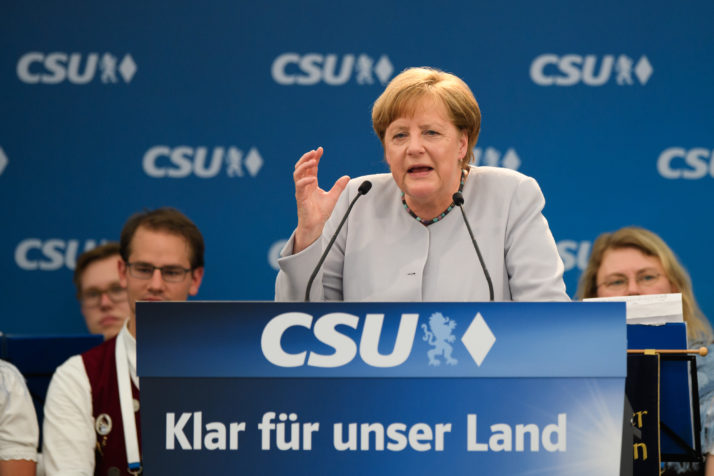Germany’s Merkel: “The times in which we could rely fully on others — they are somewhat over.”
Developments on Day 129 of the Trump Administration:
Germany’s Merkel: We Can No Long Fully Rely on US
Amid fallout from Donald Trump’s visit to the NATO and G7 summits in Europe, Germany’s Angela Merkel has raised the possibility of distancing Europe from the US Administration.
The Chancellor told a campaign rally in Munich on Sunday, a day after Trump departed, that Europe should “really take our fate into our own hands”:
The times in which we could rely fully on others — they are somewhat over. This is what I experienced in the last few days.
Merkel’s comments were given an unusual endorsement by French President Emmanuel Macron, who said that he had turned Trump’s standard power-grab handshake against the US President in a “moment of truth” (see video) — “One must show that you won’t make small concessions, even symbolic ones, but also not over-publicize things, either.” The statement followed a series of discreet but pointed Macron signals during last week’s summits, such as his effusive greeting of Merkel amid NATO leaders to leave Trump waiting.
The German Chancellor declared on Sunday:
We have to know that we must fight for our future on our own, for our destiny as Europeans….We Europeans must really take our fate into our own hands — of course in friendship with the United States of America, in friendship with Great Britain and as good neighbors wherever that is possible also with other countries, even with Russia.
But we have to know that we must fight for our future.
Ivo Daalder, the former US Ambassador to NATO, reacted:
This seems to be the end of an era, one in which the United States led and Europe followed. Today, the United States is heading into a direction on key issues that seems diametrically opposite of where Europe is heading. Merkel’s comments are an acknowledgment of that new reality.
European relations with Washington were strained before and after the US-UK war in Iraq in 2003, but there had been improvement during the Obama Administration, amid the growing political and military challenge of Russia.
Trump’s surprise election and his Administration’s rhetoric and actions have sharply altered the relationship. Uncertainty over Washington’s approach to Moscow and the escalating inquiry into Trump-Russia connections were compounded last week when Trump did not publicly endorse Article V, NATO’s clause for collective self-defense. There were further divisions at the G7: the US took the unusual step of not signing the final communique so Trump could reserve his position on climate change and withdrawal from the Paris Accord agreed by almost 200 nations.
White House officials maintained that Trump’s approach had paid dividends. They said his scolding of NATO members about financial contributions — despite Trump’s apparent failure to understand the arrangements — would reduce the burden on the US. They praised his tough position on trade, which included an insult of “bad, very bad” Germans over their automobile production, saying it would protect American companies from unfair practices.
A “senior administration official” insisted Trump had built “an extraordinary rapport with the other leaders”:
This was a summit in which the goals and priorities of the United States and the President really were felt deeply….[Trump] has changed the way many people around the world are thinking about these issues.
Merkel and Macron, with their top aides, held a bilateral meeting on Friday night in Sicily. The French President, who has appointed German speakers to critical positions, will see Russian counterpart Vladimir Putin on Monday.
Homeland Security Head: Kushner’s Secret Talks With Russia “Good Thing”
Trying to contain the furor over the effort of Donald Trump’s son-in-law Jared Kushner to establish a secret channel with Russia before Trump’s inauguration, Homeland Security Secretary John Kelly says:
Any information flow into the government and then considered by the government, I won’t criticize that All of these lines of communication are a positive thing, in my opinion.
Last Friday, US officials revealed that Kushner and Michael Flynn, the future National Security Advisor, asked Russian Ambassador Sergei Kislyak at the start of December if the channel could be set up through the Russian Embassy. Kushner did not disclose his contacts with Kislyak until March, and then did not mention the attempt at the channel.
The development came days after Kushner was identified as a focus of the FBI and Congressional investigations into possible collusion between Russia and the Trump campaign.
See Podcast: Kushner & Trump-Russia Overshadow President’s European Trip
TrumpWatch, Day 127: Kushner Discussed Secret Link to Russia
Trump: Info on Kushner-Russia is “Fabricated Lies” by “Fake News Media”
Meanwhile, Donald Trump — able to access Twitter freely after his return from a nine-day overseas trip — fired off a series of angry tweets:
It is my opinion that many of the leaks coming out of the White House are fabricated lies made up by the #FakeNews media.
— Donald J. Trump (@realDonaldTrump) May 28, 2017
The Fake News Media works hard at disparaging & demeaning my use of social media because they don’t want America to hear the real story!
— Donald J. Trump (@realDonaldTrump) May 29, 2017
Trump — who has carried out his own leaks, using fake identities, to the media in the past and who praised WikiLeaks and other disclosures about Hillary Clinton during the 2016 campaign — did not specifically refer to Kushner’s situation.
A “senior administration official” tried another approach with the media as the Trump entourage was flying home from Europe:
Leaving this here without comment. A senior administration official to reporters on Air Force One: pic.twitter.com/SDlUvQBMmQ
— Philip Crowther (@PhilipinDC) May 28, 2017

